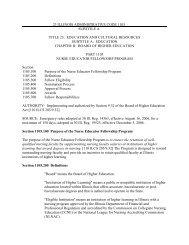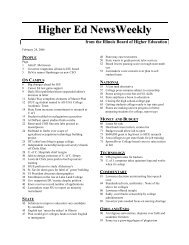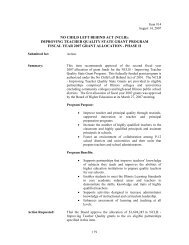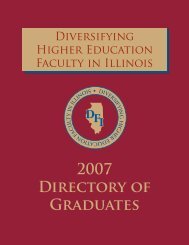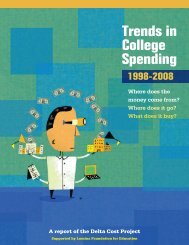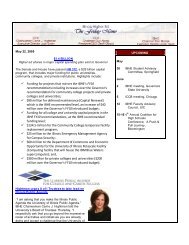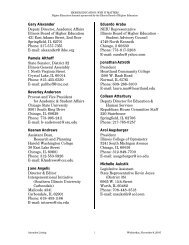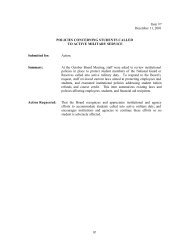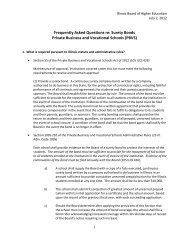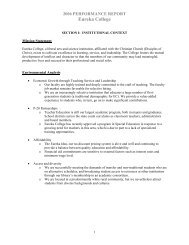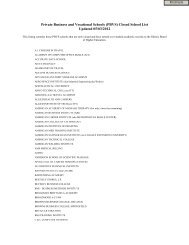A Report on the Feasibility of Textbook Rental - IBHE
A Report on the Feasibility of Textbook Rental - IBHE
A Report on the Feasibility of Textbook Rental - IBHE
You also want an ePaper? Increase the reach of your titles
YUMPU automatically turns print PDFs into web optimized ePapers that Google loves.
ook wholesalers, stands this issue <strong>on</strong> its head. According to Nebraska Book datapublished in a recent report by <strong>the</strong> Used <strong>Textbook</strong> Associati<strong>on</strong> (UTA), <strong>the</strong> frequency <strong>of</strong>new editi<strong>on</strong>s has barely changed since 1992. Nebraska’s data indicates that <strong>the</strong> increasein new editi<strong>on</strong>s with <strong>on</strong>e- or two- year revisi<strong>on</strong> cycles is inc<strong>on</strong>sequential, 227 titles with<strong>on</strong>e-year revisi<strong>on</strong>s and 1,700 with two-year revisi<strong>on</strong>s out <strong>of</strong> a total <strong>of</strong> 178,827 titles. Inc<strong>on</strong>trast those titles with three, four or five plus years between revisi<strong>on</strong>s were 3,074,1,684 and 2,818, respectively. In total, <strong>the</strong>re were 169,324 titles that were not revisedversus <strong>on</strong>ly 9,503 that were, representing five percent <strong>of</strong> <strong>the</strong> total titles over a period <strong>of</strong>five plus years. There is no indicati<strong>on</strong> <strong>of</strong> <strong>the</strong> subjects <strong>of</strong> <strong>the</strong> titles that were revised, why<strong>the</strong>y were revised or why faculty chose <strong>the</strong>m over older editi<strong>on</strong>s or competing productsfrom o<strong>the</strong>r publishers.Ir<strong>on</strong>ically, <strong>the</strong> UTA report did say, “Most bookstore managers (94%) believe newtextbook editi<strong>on</strong>s come out too frequently.” This opini<strong>on</strong>, we believe, is heavilyinfluenced by <strong>the</strong> preference <strong>of</strong> bookstore managers to sell used books because <strong>the</strong>irreturn is higher <strong>on</strong> each sale.The absolute bottom line is that no textbook or supplemental learning tool – new editi<strong>on</strong>or old – will be produced by publishers if <strong>the</strong>re is no market. As with any highlycompetitive sector with a tremendously diverse c<strong>on</strong>sumer base – <strong>the</strong>re are some <strong>on</strong>emilli<strong>on</strong> faculty nati<strong>on</strong>wide – and a large number <strong>of</strong> product alternatives – numeroustextbooks with a wide range <strong>of</strong> price, course packs, free <strong>on</strong>line textbooks, materialsdrawn from <strong>the</strong> web and pr<strong>of</strong>essors own works, to menti<strong>on</strong> a few – <strong>on</strong>ly <strong>the</strong> best willsurvive.• The report does not include cost-saving recommendati<strong>on</strong>s for bookstores. Bookstores play acrucial role in <strong>the</strong> final price <strong>of</strong> a text, marking up new texts approximately 33 percent and usedbooks by 50 percent. If bookstore markups were decreased, students would see an immediatesavings <strong>on</strong> <strong>the</strong>ir textbook expenditures.Opti<strong>on</strong>s for Alternative Cost-Saving Measures, page 7State• Bullet 1 – “…cost-effective practices” – In almost all instances, <strong>the</strong> language used in this c<strong>on</strong>text“encourages” faculty and includes <strong>the</strong> words “without reducing <strong>the</strong> quality <strong>of</strong> instructi<strong>on</strong>.”• Bullet 2 – “Require sample copies” – Who is to provide <strong>the</strong>se samples? Nei<strong>the</strong>r publishers norany o<strong>the</strong>r private business can be required to provide free goods or services as a c<strong>on</strong>diti<strong>on</strong> <strong>of</strong>doing business. A practice <strong>of</strong> this kind would likely violate Illinois law and ethics requirements.Also, we have found that college departments usually object to providing “free” textbooksbecause <strong>of</strong> <strong>the</strong> pressure this places <strong>on</strong> <strong>the</strong>ir budget and <strong>the</strong> difficulties <strong>of</strong> administering this kind<strong>of</strong> program.• Bullet 3 – “Prohibit …benefiting financially” – This language can create difficulties for facultywho author materials, receive h<strong>on</strong>orariums for peer reviews <strong>of</strong> materials or participate in subjectseminars, for example. We suggest you c<strong>on</strong>sider <strong>the</strong> following language drawn from a bill passedby <strong>the</strong> New York Senate. Note that <strong>the</strong> bill precludes <strong>the</strong> sale <strong>of</strong> textbook samples, an unethicalpractice that drives up <strong>the</strong> cost <strong>of</strong> textbooks.o “No employee at an instituti<strong>on</strong> <strong>of</strong> higher educati<strong>on</strong> shall demand or receive any payment,loan, advance, or deposit <strong>of</strong> m<strong>on</strong>ey, present or promised, for adopting specific coursematerials required for coursework or instructi<strong>on</strong>; with <strong>the</strong> excepti<strong>on</strong> that <strong>the</strong> employeemay receive: 1) sample copies, instructor’s copies, or instructi<strong>on</strong>al material, that are notto be sold; 2) royalties or o<strong>the</strong>r compensati<strong>on</strong> from sales <strong>of</strong> textbooks that include such-73-



